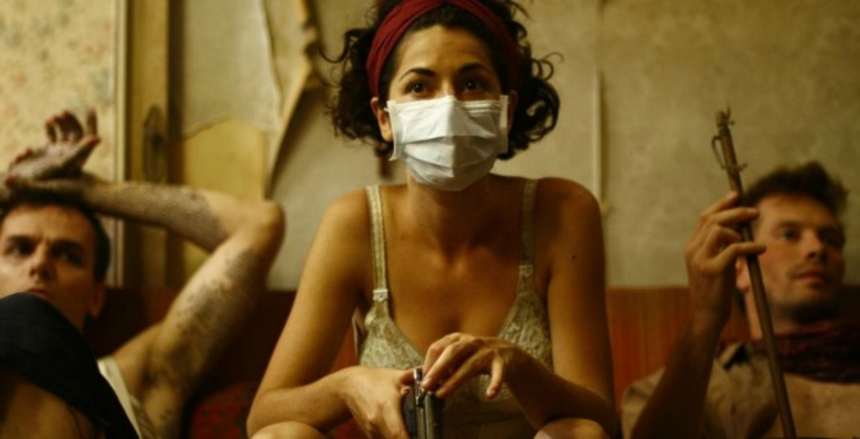Frightfest 2013 Review: THE DESERT is an Intense Post-Apocalypse Love Story

Ana (Victoria Almeida), Jonathan (William Prociuk) and Axel (Lautaro Delgado) have survived the zombie apocalypse in a house they've fortified into a bunker. They place microphones around the property to hear the zombies coming (though at this point they seem to be few and far between). They have a system to ration food and water, and other than dealing with pesky flies, manage to survive. But Jonathan and Ana are lovers, which leaves Axel isolated, He keeps busy by tattooing flies on his body, Ana records video of herself talking about her past and the present, and Jonathan dares Axel into acts that may cause them all to die. What was once a happy family becomes, well, an unhappy family, trapped by circumstance.
Behl never shows what lies beyond the trios' compound, and the majority of shots (done with a handheld camera) are close ups. This ramps up the feeling of claustraphobia. It is as if the audience if crammed into this space with them. It must be a far-sized house, but the three are constantly on top of each other. And so we constantly see their bodies. Ana has several self-inflicted scars, which serve as her 'tattoos', almost as though to feel pain means to feel something, as she has become numb to existence. I must commend the make-up department for their work on Axel's fly tattoos, each one painted on by hand; they accumulate through the film, Axel disappearing as if he one of the bodies in the streets (he says once it is done, he will leave the compound, causing Jonathan to waver between assisting in the process of refusing for fear of family break-up). At points, Jonathan undresses Ana while she is asleep, allowing Axel to see her naked, teasing his that he (Jonathan) can touch Ana and Axel can't, and allowing Axel to have some indulgence. Ana seems somewhat aware of this, but all three's strength to fight the tide of emotional instability has almost disappeared, and the situation is a cat-and-mouse game of who will crack first.
So they can listen for the zombies, but we do not see them, until after a trip to get supplies, Axel and Jonathan capture one (who they name Pythagoras) and tie up as their 'pet'. Ana protests at first, but becomes the most obsessed with him. One of the main ideas is the film is communication. Pythagoras is the only zombie seen; the three 'hear' the zombies, but they are shot off-camera. Conversation between them is more and more cryptic, as they all become both brutally honest and incredibly evasive. The dialogue has an improvised feel, as though Behl had left the actors in a room alone for several days to help them understand the mental state in which these characters exist. In the end, all are videotaping themselves, and all are watching the tapes of each other, as if this is the only way they can communicate. The camera is their confessor.
Horror fans know that monsters such as zombies, or ghosts, or other fantastic things or situations are simply another mode that filmmakers have to discuss various themes shown in more obvious ways in social realistic cinema (or at least, the good horror films). The zombie apocalypse has turned Ana, Axel and Jonathan into living ghosts, and their compound into a haunted house from which they will not escape (though technically they can, though they have no idea if the outside world is safe). They disintegrate into torturing each other, and themselves. Ana's final desperate act, her rebellion against Axel's obsession and rejection, and Jonathan's attempts at control, is understandable and, well, 'heartbreaking' doesn't even begin to cover it.
Make no mistake, this isn't a zombie film, or one could argue a horror film, in the traditional sense. But it is terrifying; it is about the worst that could happen: survival, but at the cost of emotional stability and sanity. You don't need the constant threat of a zombie attack for tension, nor even the danger of physical violence from other humans. It is the slow mental and emotional breakdown, whether self inflicted or inflicted by those who supposedly love you.
Behl places his camera in his character's faces, and shows their world slowly disintegrating. I was visibly shaking at the end, and I think much of the rest of the audience was. This is the film that you will find yourself thinking about as you look around your home (what if I'm stuck in this one place for the rest of my life, with only a few other people?) or you talk to your friends (would I be able to live with this person, and them alone, for the rest of my life?). It's the best kind of tight, intimate character studies, and an extraordinary film.

Do you feel this content is inappropriate or infringes upon your rights? Click here to report it, or see our DMCA policy.





